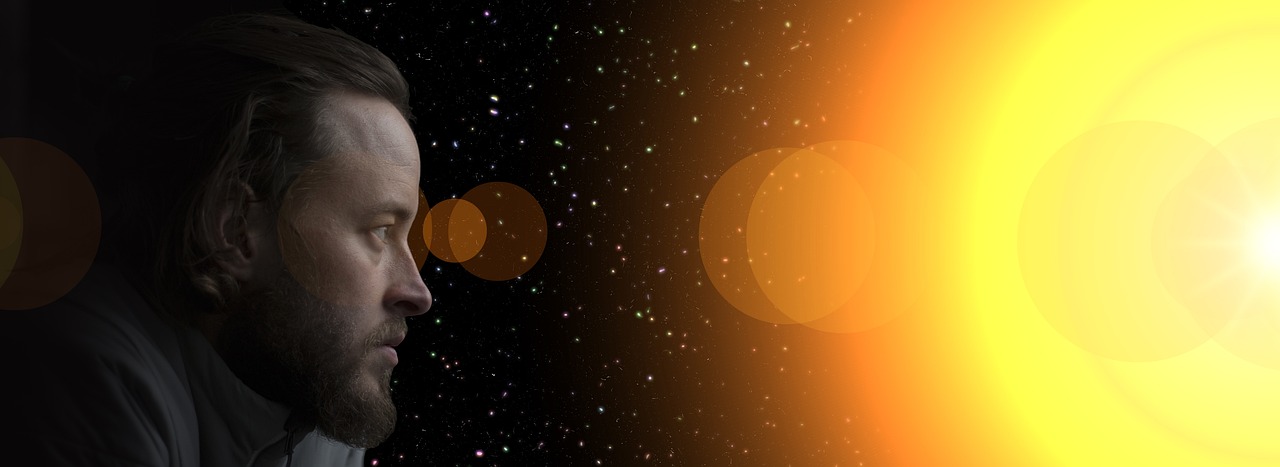An Introduction to Quantum Philosophy
Welcome to the fascinating world of quantum philosophy, where the realms of science and philosophy intertwine in unexpected ways! This article explores the intriguing intersection of quantum mechanics and philosophical inquiry, shedding light on how quantum principles challenge traditional views of reality, knowledge, and existence. Imagine standing at the edge of a cliff, peering into an abyss of uncertainty, where every step you take can lead to a different reality. This is the essence of quantum philosophy—a journey into the unknown that forces us to question everything we thought we knew.
At its core, quantum philosophy invites us to rethink our understanding of the universe. It pushes us to consider the implications of quantum mechanics not just as a scientific framework, but as a profound challenge to our very perceptions of reality. Have you ever wondered how something can exist in multiple states at once? Or how two particles can be entangled in such a way that the state of one instantly influences the state of another, regardless of distance? These mind-bending concepts serve as the foundation for philosophical discussions that extend far beyond the laboratory.
As we dive deeper into this exploration, we'll uncover the fundamental principles of quantum mechanics, such as superposition, entanglement, and uncertainty. Each of these concepts not only reshapes our understanding of physics but also raises profound questions about existence and our place in the cosmos. It's as if quantum mechanics has thrown a cosmic dice, and the outcomes are both surprising and bewildering.
So, whether you're a seasoned physicist or a curious mind seeking to understand the universe's mysteries, quantum philosophy offers a rich tapestry of ideas that challenge our perceptions and expand our horizons. Ready to embark on this intellectual adventure? Let's unravel the threads of quantum mechanics and see how they weave into the fabric of philosophical thought!
Understanding quantum mechanics is essential for delving into quantum philosophy. This section introduces core concepts like superposition, entanglement, and uncertainty, which form the foundation for philosophical discussions.
Quantum philosophy raises profound questions about reality and perception. Here, we explore inquiries about determinism, the nature of existence, and the implications of observer effects on our understanding of the universe.
This subsection examines the stark contrasts between quantum and classical realities, highlighting how quantum phenomena challenge our intuitive understanding of the world and prompt philosophical reflection.
The observer effect in quantum mechanics suggests that observation influences reality. This segment discusses its implications for epistemology and how it reshapes our understanding of knowledge.
Quantum mechanics introduces uncertainty, prompting debates about free will. This part analyzes how quantum philosophy intersects with concepts of autonomy and determinism.
This section delves into how quantum mechanics influences metaphysical discussions, including the nature of existence, causality, and the fabric of reality itself.
Quantum philosophy is not just theoretical; it has practical implications in modern science. This section highlights its impact on fields like technology, cosmology, and consciousness studies.
Quantum computing represents a significant leap in technology, raising philosophical questions about information, computation, and the nature of intelligence in a quantum context.
The relationship between consciousness and quantum mechanics is a hotly debated topic. This subsection explores various theories that attempt to connect quantum processes with consciousness and perception.
- What is quantum philosophy? Quantum philosophy explores the implications of quantum mechanics on our understanding of reality, existence, and knowledge.
- How does quantum mechanics differ from classical mechanics? Quantum mechanics allows for phenomena like superposition and entanglement, which do not exist in classical mechanics.
- What is the observer effect? The observer effect refers to the theory that the act of observation can influence the state of a quantum system.
- Does quantum mechanics support free will? Quantum mechanics introduces uncertainty, leading to debates about the nature of free will and determinism.

The Basics of Quantum Mechanics
Understanding quantum mechanics is essential for delving into quantum philosophy. At its core, quantum mechanics is the branch of physics that deals with the behavior of matter and energy at the smallest scales—think atoms and subatomic particles. Unlike classical mechanics, which describes the motion of larger objects in a predictable manner, quantum mechanics introduces a level of unpredictability and complexity that can be both fascinating and perplexing. This unpredictability stems from several key concepts that challenge our traditional views of reality.
One of the most intriguing principles of quantum mechanics is superposition. Imagine flipping a coin; while it’s spinning in the air, it’s both heads and tails at the same time until you catch it. In quantum mechanics, particles exist in multiple states simultaneously until they are observed. This idea leads to the notion that reality is not as straightforward as we perceive it; instead, it’s a web of possibilities waiting to be realized.
Another fundamental concept is entanglement, which Einstein famously referred to as "spooky action at a distance." When two particles become entangled, the state of one particle is directly linked to the state of another, no matter how far apart they are. This phenomenon raises profound questions about the nature of connection and interaction in the universe. It challenges our understanding of locality and suggests that the universe is far more interconnected than we might think.
Then we have the uncertainty principle, articulated by Werner Heisenberg. This principle posits that certain pairs of physical properties, like position and momentum, cannot be simultaneously measured with arbitrary precision. The more accurately we know one of these properties, the less accurately we can know the other. This limitation is not just a reflection of our measurement tools; it’s a fundamental property of nature itself. It suggests that at the quantum level, certainty is an illusion, and unpredictability reigns supreme.
To better understand these concepts, consider the following table that summarizes the core principles:
| Concept | Description |
|---|---|
| Superposition | Particles exist in multiple states until observed. |
| Entanglement | Particles remain connected regardless of distance. |
| Uncertainty Principle | Certain pairs of properties cannot be measured precisely at the same time. |
These principles form the bedrock of quantum mechanics and serve as a launchpad for deeper philosophical inquiries. They challenge our conventional notions of reality, urging us to reconsider what we understand about existence and perception. As we explore the implications of these concepts, we begin to see how they intertwine with philosophical questions about determinism, free will, and the nature of knowledge itself.
In summary, the basics of quantum mechanics unveil a world that is not only fascinating but also perplexing. It invites us to question our understanding of reality and opens up a plethora of philosophical discussions that resonate far beyond the realm of physics. So, are you ready to dive deeper into the philosophical implications of these quantum principles?

Quantum philosophy raises profound questions that challenge our understanding of reality and perception. At its core, this discipline invites us to ponder the very nature of existence and the mechanisms that govern our universe. One of the most compelling inquiries is whether the universe is deterministic or probabilistic. In classical physics, the universe operates like a well-oiled machine, where every action has a predictable reaction. However, quantum mechanics introduces a layer of uncertainty that shakes the foundations of this belief. Imagine a world where outcomes are not set in stone but are instead a dance of possibilities, waiting for an observer to tip the scales. This leads us to wonder: if the universe is inherently uncertain, what does that mean for our understanding of fate and free will?
Another critical question revolves around the implications of the observer effect. In quantum mechanics, the act of observation alters the state of a particle. This phenomenon prompts us to ask: does our perception shape reality? If an observer can influence the outcome of an experiment simply by observing it, what does that imply about our role in the universe? Are we mere spectators, or do we actively participate in the creation of reality? This idea brings forth exciting philosophical discussions about epistemology—the study of knowledge itself. It challenges us to rethink how we acquire knowledge and whether we can ever truly know something without altering it in the process.
Moreover, quantum philosophy invites us to consider the implications of entanglement. When particles become entangled, they remain connected regardless of the distance separating them. This phenomenon raises questions about the nature of connection and separation in our universe. Can two entities be fundamentally linked in a way that transcends space and time? This leads to deeper inquiries about the fabric of reality and the interconnectedness of all things. Just as threads in a tapestry create a beautiful pattern, could the universe be a vast web of interrelated events and entities, all influencing one another in ways we have yet to fully comprehend?
As we explore these questions, it becomes clear that quantum philosophy is not just an abstract pursuit; it has real implications for how we understand ourselves and our place in the cosmos. The intersection of quantum mechanics and philosophical inquiry opens new avenues for exploration, inviting us to challenge our assumptions and embrace the mysteries of existence. It’s a thrilling journey, one that encourages us to keep asking questions and seeking answers, even when they lead us into the unknown.
- What is the observer effect in quantum mechanics? The observer effect refers to changes that the act of observation can make on a quantum system, suggesting that reality may be influenced by our perceptions.
- How does quantum mechanics challenge determinism? Quantum mechanics introduces uncertainty and probabilistic outcomes, suggesting that not all events are predetermined.
- What is quantum entanglement? Quantum entanglement is a phenomenon where two or more particles become linked, such that the state of one particle can instantaneously influence the state of another, regardless of distance.
- Can quantum mechanics explain consciousness? While some theories suggest a connection between quantum processes and consciousness, this remains a hotly debated topic with no definitive answers.

When we dive into the realm of quantum reality, we find ourselves in a world that defies the conventional rules governing our everyday experiences. In classical physics, we are accustomed to a universe that is predictable and deterministic, where objects exist in a specific state at any given time. However, quantum mechanics flips this notion on its head. Imagine a world where particles can exist in multiple states simultaneously—this is the essence of superposition. It's like trying to catch a fish that can be in two ponds at once! This tantalizing concept suggests that reality is not as straightforward as we perceive it to be.
Furthermore, the phenomenon of entanglement introduces an even more bewildering layer to our understanding of reality. In classical terms, objects are independent; their properties can be measured without affecting one another. Yet, in the quantum world, particles can become entangled, meaning the state of one particle is directly related to the state of another, no matter how far apart they are. Picture this: you and a friend each have a pair of dice. If you roll a six, your friend, no matter if they're in another city, will also roll a six! This instantaneous connection challenges our notions of locality and causality, raising profound philosophical questions about the nature of existence itself.
But what does this mean for our understanding of reality? The stark contrast between quantum and classical realities compels us to reconsider our intuitive grasp of the universe. In classical physics, we can predict outcomes with certainty, but quantum mechanics introduces a veil of uncertainty. The Heisenberg Uncertainty Principle states that we cannot simultaneously know both the position and momentum of a particle with absolute precision. This uncertainty is not just a limitation of our measuring tools; it’s a fundamental property of nature. So, when we ponder questions about reality and existence, we must grapple with this inherent unpredictability that quantum mechanics presents.
To summarize the differences between quantum and classical realities, consider the following table:
| Aspect | Classical Reality | Quantum Reality |
|---|---|---|
| Determinism | Predictable and deterministic | Probabilistic and uncertain |
| State of Objects | Objects exist in a definite state | Objects can exist in multiple states (superposition) |
| Interaction | Independent interactions | Entangled interactions across distances |
| Measurement | Exact outcomes | Outcomes affected by observation |
This juxtaposition of realities not only fascinates physicists but also philosophers. It raises questions about our perception of reality and challenges our understanding of existence. Are we merely observers in a universe governed by quantum laws, or do we play an active role in shaping reality? Quantum philosophy invites us to ponder these mysteries, urging us to explore the very fabric of existence.
As we continue to unravel the complexities of quantum mechanics, we realize that the implications extend far beyond physics. They touch upon our understanding of consciousness, free will, and the nature of reality itself. In this ever-evolving dialogue between science and philosophy, one thing is clear: the journey into quantum reality is just beginning, and the questions it raises are as profound as the universe itself.
- What is quantum mechanics? Quantum mechanics is a fundamental theory in physics that describes the physical properties of nature at the scale of atoms and subatomic particles.
- How does quantum mechanics differ from classical mechanics? Quantum mechanics incorporates principles of uncertainty and superposition, while classical mechanics is based on deterministic laws.
- What is the observer effect? The observer effect refers to changes that the act of observation can make on a phenomenon being observed, particularly in quantum mechanics.
- Can quantum mechanics explain consciousness? There are various theories, but the relationship between quantum mechanics and consciousness remains a topic of ongoing debate and research.

In the realm of quantum mechanics, the observer effect is a concept that has sparked intense philosophical debate and curiosity. At its core, this idea suggests that the act of observing a quantum system can fundamentally alter its state. Imagine you’re peeking into a box to see a cat; your mere act of looking might change whether that cat is alive or dead! This analogy highlights how our interaction with the quantum world is not merely passive but actively shapes reality.
This leads us to ponder: what does it mean to observe? In quantum mechanics, observation is not just about sight; it involves measurement, which collapses a quantum system’s wave function into a definite state. Before observation, particles exist in a state of superposition, where they can be in multiple states at once. Upon measurement, they 'choose' a state. This phenomenon raises profound questions about the nature of reality itself. Are we, as observers, co-creators of the universe? Or are we merely witnesses to a reality that exists independently of us?
The implications of the observer effect extend beyond physics and into the realm of epistemology—the study of knowledge. If our observations can influence outcomes, how can we claim to know anything objectively? This uncertainty challenges traditional notions of knowledge and reality. To illustrate, consider the following points:
- Subjectivity of Experience: Each observer brings their own perspective, which colors their interpretation of reality.
- Measurement as Interaction: The process of measuring is an interaction that changes the system being observed.
- Philosophical Implications: This leads to questions about determinism and free will—if our observations can change reality, what does that say about our autonomy?
Furthermore, the observer effect challenges the classical view of an objective reality. In classical physics, the universe operates independently of our observations, much like a movie playing on a screen. However, quantum mechanics suggests that our very act of watching can change the narrative. This revelation pushes us to rethink the fundamental nature of existence and our place within it.
In conclusion, the role of the observer in quantum mechanics opens up a Pandora's box of philosophical inquiries. It compels us to ask not only what reality is but also how our perceptions and interactions shape that reality. As we delve deeper into these questions, we may find ourselves at the intersection of science and philosophy, where the lines between observer and observed blur, leading to a richer understanding of the universe.
- What is the observer effect in quantum mechanics? The observer effect refers to changes that the act of observation can make on a quantum system, fundamentally altering its state.
- Does the observer effect mean reality doesn't exist without observation? While it raises questions about the nature of reality, it doesn't necessarily imply that reality doesn't exist independently; rather, it suggests a complex relationship between observation and existence.
- How does the observer effect relate to free will? The observer effect introduces uncertainty, prompting debates about whether our choices are predetermined or influenced by our observations.

The concept of free will has long been a cornerstone of philosophical inquiry, but when we introduce the principles of quantum mechanics into the mix, everything gets a little murky. Traditionally, free will suggests that individuals have the power to make choices independent of external influences. However, the inherent uncertainty in quantum mechanics raises questions about how much control we truly have over our actions. Is our decision-making process influenced by quantum events, or are we merely puppets dancing to the tune of deterministic laws?
To understand the implications of quantum mechanics on free will, we must first consider the role of randomness in quantum events. Unlike classical physics, where events can often be predicted with precision, quantum mechanics introduces an element of randomness that suggests not everything is predetermined. This randomness could imply that our choices are not entirely fixed, allowing for a space where free will might exist. But, does this mean we have true autonomy, or is it just an illusion?
Moreover, if our choices are influenced by quantum fluctuations, does that mean we are less responsible for our actions? Some argue that if our decisions can be swayed by unpredictable quantum events, then the notion of moral responsibility becomes complicated. After all, how can we hold someone accountable for actions that may have been influenced by chance rather than conscious choice?
To explore these ideas further, let’s consider a few key perspectives that emerge from the intersection of quantum mechanics and free will:
- Compatibilism: This view suggests that free will and determinism are not mutually exclusive. In this framework, even if quantum events introduce randomness, individuals can still exercise free will in their decision-making processes.
- Libertarianism: Advocates of this position argue that for free will to exist, our choices must be entirely free from deterministic influences, including those from quantum mechanics. They believe that true autonomy is essential for moral responsibility.
- Hard Determinism: This perspective posits that if all events, including human decisions, are determined by preceding causes, then free will is an illusion. Quantum randomness may not provide the freedom we think it does.
In conclusion, the implications of quantum mechanics for free will are profound and complex. As we delve deeper into the mysteries of the quantum realm, we must grapple with the very nature of our existence and the extent of our autonomy. Are we the architects of our destiny, or are we merely navigating a path laid out by the whims of quantum uncertainty? These are questions that challenge our understanding of reality and provoke us to rethink the essence of free will itself.
Frequently Asked Questions
1. Does quantum mechanics prove that we have free will?
Quantum mechanics introduces uncertainty, which some interpret as a space for free will to exist. However, it does not definitively prove that free will is real; rather, it complicates our understanding of choice.
2. How does randomness in quantum events affect moral responsibility?
If our decisions can be influenced by random quantum events, it raises questions about accountability. The relationship between free will and moral responsibility becomes more complex as a result.
3. Can free will and determinism coexist?
Yes, some philosophical perspectives, like compatibilism, argue that free will can exist alongside determinism, suggesting that our choices can still be meaningful even in a deterministic framework.

When we dive into the realm of quantum mechanics, we inevitably brush up against the boundaries of metaphysics. This intersection raises profound questions about the very nature of reality and existence. At its core, quantum mechanics challenges traditional notions of causality and determinism, suggesting that the universe operates on principles that are often counterintuitive and elusive. Imagine a universe where particles can exist in multiple states at once, only to settle into a single state upon observation—this is the essence of superposition.
In classical physics, we are accustomed to a world that adheres to predictable laws and clear causal relationships. However, quantum mechanics introduces a level of uncertainty that shakes the foundations of our understanding. For instance, the concept of entanglement reveals that particles can become interconnected in ways that transcend space and time. This phenomenon prompts us to reconsider our ideas about individuality and separation, suggesting that at a fundamental level, everything in the universe might be interrelated.
Moreover, the implications of quantum mechanics extend beyond the physical realm, touching upon metaphysical themes such as existence itself. If particles can exist in multiple states or be instantaneously connected across vast distances, what does that say about the nature of reality? Are we merely observers in a universe that is constantly shifting and changing, or do we play a more active role in shaping it? These questions lead us to explore the concept of observer-dependent reality, where the act of observation influences the state of what is being observed. This idea blurs the lines between subjective and objective reality, challenging our understanding of knowledge.
To illustrate the relationship between quantum mechanics and metaphysics, consider the following table:
| Quantum Concept | Metaphysical Implication |
|---|---|
| Superposition | Reality is not fixed; possibilities coexist until observed. |
| Entanglement | Interconnectedness of all things; separation is an illusion. |
| Observer Effect | Knowledge is subjective; perception shapes reality. |
| Uncertainty Principle | Limits of knowledge; reality is inherently unpredictable. |
As we ponder these metaphysical implications, we must also consider the nature of causality. In classical terms, every effect has a cause, and events unfold in a linear fashion. However, quantum mechanics introduces a level of randomness that challenges this linearity. Events may not always happen because of a direct cause; instead, they might arise from a complex web of probabilities. This shift invites us to explore a more holistic understanding of causation, one that encompasses both the deterministic and the unpredictable.
In conclusion, the relationship between quantum mechanics and metaphysics is a fascinating area of inquiry that invites us to rethink our assumptions about reality, existence, and knowledge. As we continue to unravel the mysteries of the quantum world, we find ourselves not just as passive observers but as active participants in the unfolding tapestry of the universe. So, the next time you ponder the nature of reality, remember that in the quantum realm, the possibilities are as vast as the cosmos itself.
- What is quantum mechanics? Quantum mechanics is a fundamental theory in physics that describes the physical properties of nature at the scale of atoms and subatomic particles.
- How does quantum mechanics relate to metaphysics? Quantum mechanics challenges traditional views of reality, causality, and existence, prompting deep philosophical inquiries about the nature of the universe.
- What is the observer effect? The observer effect refers to changes that the act of observation can make on a phenomenon being observed, suggesting that reality may depend on perception.
- Can quantum mechanics explain consciousness? While some theories suggest a connection between quantum processes and consciousness, this remains a highly debated topic within both science and philosophy.

Quantum philosophy is not merely an abstract concept confined to the realm of theoretical discussions; it has profound and practical implications that resonate deeply within modern science. As we venture into the intricate world of quantum mechanics, we uncover how its principles influence various scientific fields, reshaping our understanding of reality, technology, and even consciousness. Imagine standing at the edge of a vast ocean, where each wave represents a new discovery, and every drop of water signifies the endless possibilities that quantum philosophy presents. This is precisely the landscape we are navigating today.
One of the most significant areas impacted by quantum philosophy is technology, particularly through advancements in quantum computing. Unlike classical computers that rely on bits as the smallest unit of data, quantum computers utilize qubits, which can exist in multiple states simultaneously due to the principle of superposition. This fundamental shift allows quantum computers to process information at unprecedented speeds, solving complex problems that would take traditional computers eons to crack. The implications are staggering, ranging from cryptography to drug discovery, where the ability to simulate molecular interactions can lead to groundbreaking medical advancements.
Moreover, quantum mechanics has sparked a revolution in our understanding of the universe itself. In cosmology, the interplay between quantum principles and the fabric of space-time has led to intriguing theories about the origins of the universe. For instance, the concept of quantum fluctuations suggests that the universe may have emerged from a vacuum state, challenging classical notions of causality and existence. This intersection of quantum philosophy and cosmology invites us to ponder profound questions about our origins and the nature of reality itself.
Another fascinating area influenced by quantum philosophy is the study of consciousness. The relationship between consciousness and quantum mechanics is a hotly debated topic, with various theories attempting to bridge these two complex domains. Some propose that consciousness arises from quantum processes within the brain, suggesting that our perception of reality might be fundamentally linked to quantum phenomena. This perspective not only challenges traditional views of consciousness but also raises questions about the nature of self and existence. Are we merely observers in a universe governed by quantum mechanics, or do we play a more active role in shaping reality?
To further illustrate the impact of quantum philosophy in modern science, let's take a look at a table summarizing key areas where quantum principles are reshaping our understanding:
| Field | Impact of Quantum Philosophy |
|---|---|
| Technology | Advancements in quantum computing, leading to faster processing and new algorithms. |
| Cosmology | Theories on the universe's origins based on quantum fluctuations, challenging classical causality. |
| Consciousness Studies | Exploration of the link between quantum processes and consciousness, questioning the nature of reality. |
In conclusion, the intersection of quantum philosophy and modern science is a vibrant and evolving field that invites us to question our understanding of reality. As we continue to explore these profound ideas, we may find that the answers to some of our most pressing questions about existence, knowledge, and the universe are intricately woven into the fabric of quantum mechanics.
- What is quantum philosophy? Quantum philosophy explores the implications of quantum mechanics on our understanding of reality, knowledge, and existence.
- How does quantum computing work? Quantum computing uses qubits, which can exist in multiple states at once, allowing for faster processing of information compared to classical computers.
- What is the relationship between quantum mechanics and consciousness? Various theories suggest that quantum processes may play a role in consciousness, challenging traditional views on the nature of self and perception.
- How does quantum philosophy impact cosmology? Quantum principles have led to new theories about the origins of the universe, suggesting that it may have emerged from quantum fluctuations.

Quantum computing is not just a buzzword; it represents a revolutionary leap in the way we process information. Traditional computers use bits as the smallest unit of data, which can either be a 0 or a 1. In contrast, quantum computers utilize qubits, which can exist in a state of superposition. This means a qubit can be both 0 and 1 at the same time, opening up a universe of possibilities for computation. Imagine trying to navigate a vast library: a classical computer would search each aisle one by one, while a quantum computer could explore multiple aisles simultaneously, drastically reducing the time needed to find the right book.
This unique property of qubits leads to an exponential increase in processing power. For instance, while a classical computer might take years to solve complex problems, a quantum computer could potentially do it in mere seconds. This capability is not just theoretical; it has real-world implications across various fields, including cryptography, drug discovery, and optimization problems. In fact, companies like Google and IBM are racing to develop quantum computers that can solve problems that are currently intractable for classical systems.
Moreover, quantum computing raises intriguing questions about the nature of information itself. For example, how does information exist in a quantum state? Is it fundamentally different from classical information? These inquiries lead us to the heart of information theory, which studies the quantification, storage, and communication of information. In the quantum realm, the very act of measuring a qubit can alter its state, creating a paradox where the observer plays a critical role in the existence of the information being processed. This challenges our traditional notions of data integrity and reliability.
To better understand the implications of quantum computing on information theory, consider the following table that outlines key differences between classical bits and quantum bits:
| Aspect | Classical Bits | Quantum Bits (Qubits) |
|---|---|---|
| State | 0 or 1 | 0, 1, or both (superposition) |
| Processing | Sequential | Parallel |
| Measurement | Does not affect state | Affects state (observer effect) |
| Entanglement | Not applicable | Yes, qubits can be entangled |
This table illustrates how quantum computing fundamentally alters our understanding of information. The concept of entanglement—where qubits become interlinked in such a way that the state of one instantly influences the state of another, regardless of distance—further complicates the landscape. It invites us to reconsider everything we thought we knew about data transmission and security. For example, quantum key distribution (QKD) leverages entanglement to create unbreakable encryption methods, ensuring that any attempt to intercept the communication would be immediately detectable.
In conclusion, the intersection of quantum computing and information theory is a fascinating realm that challenges our conventional wisdom. As we continue to explore these concepts, we may uncover new dimensions of reality that reshape our understanding of existence, knowledge, and the universe itself. The future is bright and full of potential, but it also compels us to ask deeper questions about the very fabric of reality.
- What is a qubit? A qubit is the basic unit of quantum information, analogous to a classical bit but capable of existing in multiple states simultaneously.
- How does quantum computing differ from classical computing? Quantum computing uses qubits and allows for parallel processing, while classical computing relies on bits and processes sequentially.
- What are the practical applications of quantum computing? Quantum computing can revolutionize fields like cryptography, drug discovery, and complex optimization problems.
- What is quantum entanglement? Quantum entanglement is a phenomenon where qubits become interconnected, such that the state of one qubit can instantly affect the state of another, regardless of distance.

When we dive into the fascinating waters of consciousness and its relationship with quantum theory, we find ourselves navigating a complex and often murky landscape. Imagine trying to catch a shadow; that's how elusive the connection between consciousness and quantum mechanics can feel. At the heart of this exploration lies the question: does our awareness influence the fundamental workings of the universe? This inquiry has captivated the minds of scientists, philosophers, and curious thinkers alike.
One of the most prominent theories proposing a link between consciousness and quantum mechanics is the Orchestrated Objective Reduction (Orch-OR) theory, developed by physicist Roger Penrose and anesthesiologist Stuart Hameroff. According to this theory, consciousness arises from quantum processes occurring in the microtubules of neurons. This suggests that our thoughts and perceptions may not just be the byproducts of neural activity but instead involve quantum states that are orchestrated to produce conscious experience. It’s like saying our minds are not just computers, but quantum computers, processing information in a fundamentally different way.
Furthermore, the concept of quantum entanglement adds another layer of intrigue. Entanglement suggests that particles can become interconnected in ways that transcend traditional notions of space and time. Could it be that our consciousness operates similarly, creating connections that extend beyond our immediate perception? Some theorists propose that this interconnectedness might explain phenomena such as intuition or the feeling of being 'in tune' with the universe. It's as if our minds are part of a vast cosmic web, resonating with the fabric of reality.
However, while these theories are tantalizing, they also raise significant questions about the nature of reality itself. Are we merely observers in a quantum universe, or do we play a more active role in shaping it? This leads us to ponder the implications of the observer effect, which posits that the act of observation can alter the state of what is being observed. If our consciousness can influence quantum states, what does that say about our understanding of free will and autonomy? Are we truly in control of our actions, or are we unwitting participants in a predetermined quantum dance?
As we continue to explore the intersection of consciousness and quantum theory, it's essential to recognize that this field is still very much in its infancy. Theories abound, but empirical evidence remains elusive. Nevertheless, the potential implications are profound. Just as quantum mechanics has challenged our understanding of the physical world, integrating consciousness into this framework could revolutionize our grasp of existence itself.
In summary, the dialogue between consciousness and quantum theory is a rich and evolving conversation. As we ponder these mysteries, we may find ourselves not just questioning the nature of reality but also our place within it. The more we learn, the more we realize that the universe may be far stranger than we ever imagined.
- What is the Orch-OR theory? The Orch-OR theory suggests that consciousness arises from quantum processes in the microtubules of neurons.
- How does quantum entanglement relate to consciousness? Quantum entanglement implies that particles can be interconnected, potentially suggesting that consciousness may also operate in an interconnected manner.
- What is the observer effect? The observer effect refers to the phenomenon where the act of observation can alter the state of what is being observed in quantum mechanics.
- Are there practical applications of quantum consciousness theories? While still largely theoretical, these ideas could have implications for fields such as artificial intelligence and cognitive science.
Frequently Asked Questions
- What is quantum philosophy?
Quantum philosophy is the exploration of the philosophical implications that arise from quantum mechanics. It challenges our traditional views of reality, existence, and knowledge, prompting deep inquiries about how we understand the universe around us.
- How does quantum mechanics differ from classical mechanics?
Quantum mechanics introduces concepts like superposition and entanglement that defy the intuitive rules of classical mechanics. While classical mechanics operates on predictable trajectories, quantum mechanics reveals a world where particles can exist in multiple states at once and be interconnected across distances.
- What are some key concepts in quantum mechanics?
Some fundamental concepts include:
- Superposition: The ability of a quantum system to be in multiple states at the same time.
- Entanglement: A phenomenon where particles become interconnected, such that the state of one instantly influences the state of another, regardless of distance.
- Uncertainty Principle: The idea that certain pairs of properties, like position and momentum, cannot be simultaneously known to arbitrary precision.
- What are the philosophical questions raised by quantum mechanics?
Quantum mechanics raises profound questions about determinism, the nature of reality, and the role of the observer. For instance, does the act of observation affect the state of a quantum system? This leads to debates about the nature of existence and our understanding of knowledge.
- Can quantum mechanics influence our understanding of free will?
Yes, the inherent uncertainties in quantum mechanics challenge traditional notions of determinism. This has sparked discussions about whether our choices are truly free or if they are predetermined by preceding events, intertwining quantum philosophy with concepts of autonomy.
- What is the role of the observer in quantum mechanics?
The observer effect suggests that the act of measurement can influence the state of a quantum system. This raises intriguing questions about epistemology—how we know what we know—and challenges the idea of an objective reality independent of observation.
- How does quantum philosophy impact modern science?
Quantum philosophy has practical implications in various fields, including technology and cosmology. For instance, advancements in quantum computing are not only technological feats but also prompt philosophical discussions about information, intelligence, and the nature of computation.
- What is the connection between consciousness and quantum mechanics?
The relationship between consciousness and quantum mechanics is a hotly debated topic. Various theories suggest that quantum processes may play a role in consciousness, influencing how we perceive reality and interact with the world around us.


















